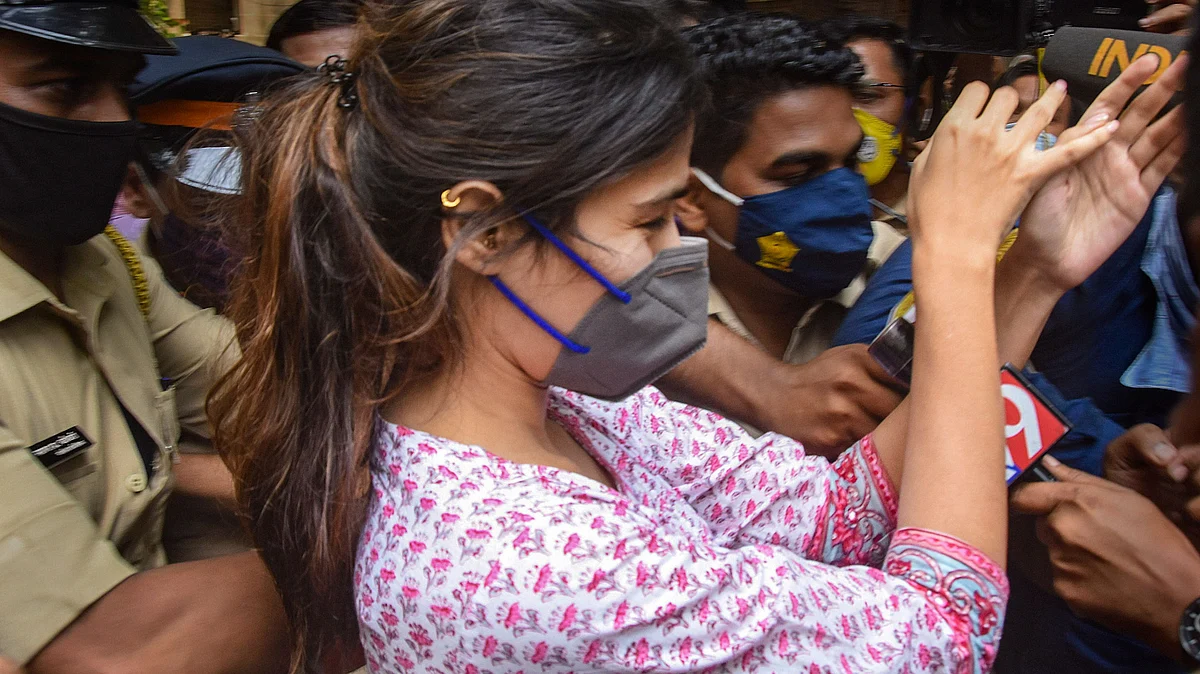
No One Feel Any Sympathy for Rhea Chakraborty
Satire: If one innocent person is freed, other innocent persons in jail may get inspired, writes Dushyant Arora.

advertisement
(The following satire has been reposted in light of the CBI’s closure report in the Sushant Singh Rajput case, which clears Rhea Chakraborty of any wrongdoing.)
“What is justice in Hindi?”
I was at a book discussion in Mumbai when I overheard a conversation between a Norwegian professor and an Indian politician—allow me to withhold the name of the party. I’m reproducing the conversation verbatim:
Professor: This Rhea Chakraborty person will now make a lot of money, won’t she? Terrible what happened to her, but at least there’s that.
Politician: Money? Why?
Professor: Oh, from the damages courts will certainly award her—so many people defamed her and accused her of murder. Now that she is cleared, she will sue them, and the courts will make them pay a lot of money.
Politician: These are all Western concepts; in India all this doesn’t happen.
Professor (shocked): Oh! That’s surprising. I thought (it) was only fair. It’s only just that a person falsely accused should get payback from all the people who maligned her. I’m sure you’re not saying justice is a Western concept, but tell me, what is fairness or justice in Indian languages?
Politician: In Hindi it is insaaf, no sorry, nyaya.
Professor (slowly repeating): insaaf and nyaya...and injustice?
Politician: Anyaay/Na-insaafi. But it is not that simple. India is complicated; you won’t understand. Spend a few years with us, and then we will talk. (Chuckles.)
The Investment in a Narrative
The CBI says that Sushant Singh Rajput died by suicide, that there was no foul play, and that Rhea is innocent.
These individuals have spent precious hours of their lives, their emotions, and willingly or unwillingly, delivering us the Bihar Assembly election. They have helped us delegitimise the then-in-power Maha Vikas Aghadi (MVA) government in Maharashtra, particularly the Thackerays, and we have more than reaped the benefits.
They have shown exemplary courage and threatened so many women with rape and murder. They have helped us mount a near-successful operation to take full control of the Hindi film industry—an endeavour that, if not for the 2024 Lok Sabha verdict, would have succeeded—and may still succeed, God willing. It was one of the greatest mass psychoses India has ever witnessed. It was beautiful. We did it.
After all this investment, all these rewards, all that we have gone through together, is it fair of us to let down these people? Risk disabusing them of their illusions? Humiliate them in public by proving them liars?
Sure, theoretically, we can find another controversy soon, another innocent person to target. But can we risk the morale going down? Of the rank and file feeling discouraged?
Don't get me wrong. It is not that I don’t understand our sincere limitations; it is not that I am unreasonable. Rhea maybe a woman, but she is not Muslim. The campaign against her could only have lasted so long.
The Consequences of Truth
We must, however, consider the consequences.
If one innocent person is freed, other innocent person currently accused or in prison may get the idea that their name may also be cleared one day. This is dangerous. There are just too many innocent people wrongly framed for us to take this risk.
The CBI has said there was no evidence of foul play. This unnecessary importance given to evidence may discourage many warriors on TV and YouTube. Tomorrow, assume we want a TV channel to run something, and the news anchor asks us to give “evidence” first and only then will they accuse someone. What will our fate be?
This business about “innocence” and “evidence” may give rise to the idea that people have rights, that it is not our will, but some system that is supposed to be fair to everyone. Take this case for example. What if Rhea Chakraborty or her supporters start demanding their right to bulldozers? Eknath Shinde ji has recently said that action has reaction. Adityanath ji and Fadnavis ji have said that damages will be recovered from the property of wrongdoers. What if people start putting 2+2 together and demand their own bulldozer justice? There are not enough bungalows in Bandra and Lutyens to withstand this.
At the moment, most Indian citizens see political parties as football clubs or IPL teams they support. They are fans. Loyal. They defend their side in debates on social media and violence on the street. If witch-hunts keep turning out to be duds, if people get disillusioned, start thinking of what else can they take from “us," how long will we remain in power? Already people like Mr Rahul Gandhi and Mr Kunal Kamra have started showing India’s constitution to people. The catastrophe that will visit us if people find the time to start reading that book cannot be overstated.
No one feel any sympathy for Rhea. Is it our fault that in all the years which have passed, she did not join “our” political parties? If she had, things would have turned out so differently. She made her choice. We made ours.
Women. Today if one person gets the idea that Rhea did not kill Sushant, tomorrow another person will say Anushka Sharma is not at fault if Virat Kohli doesn’t play well in a match. Women are a nuisance. In universities, in farmer protests, in CAA protests, in political parties, over and over again—women. Is it safe for us to let more people find out that women are being unfairly wronged?
(The author is a lawyer and research consultant based in Mumbai. This is an opinion piece, and the views expressed are the author’s own. The Quint neither endorses nor is responsible for them.)
- Access to all paywalled content on site
- Ad-free experience across The Quint
- Early previews of our Special Projects
Published: 28 Mar 2025,08:43 AM IST